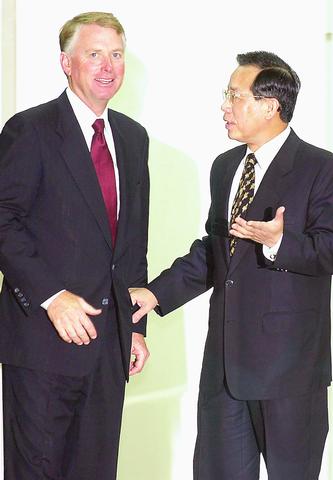Former US vice president Dan Quayle is visiting Taiwan as a consultant to Cerberus Capital Management, an investment firm interested in setting up an asset management company locally.
Quayle met Minister of Finance Yen Ching-chang (
"Because Quayle is currently involved ... in an asset management corporation, he took the opportunity to understand regulations [regarding such companies] in our financial institutions merger law," Yen said shortly after an hour-long closed-door meeting.

PHOTO: GEORGE TSORNG, TAIPEI TIMES
According to Yen, Bruno had expressed interest in setting up an asset management company in Taiwan sometime in the near future.
The government is wooing international investment banks to set up asset management companies in joint venture with domestic firms to help clean up the nation's higher number of non-performing loans.
The Financial Institutions Merger Law, which was passed last Friday, is expected to aid the financial sector's restructuring.
Leading banks are seen as interested in coming to Taiwan to set up asset management corporations.
Quayle, however, declined to comment on the exact nature of his visit. The main purpose of this visit, he said, was to "see some friends in Taiwan and to have some good conversations with the president this afternoon."
Quayle met with President Chen Shui-bian (
He also met with the leaders of Shinkong Group yesterday and is expected to meet with the representatives of the Koo's Group and KMT chairman Lien Chan (
Stanley Kao (
Jackson is director of Asian Studies at Paul H. Nitze School of Advanced International Studies at John Hopkins University.
While Quayle is not expected to take up a government post, his influence may grow if George W. Bush wins the final vote tally in Florida. Quayle, 53, served as US vice president under former president George Bush from 1989 to 1992. The Bush-Quayle team lost their re-election bid in 1992 to the current Clinton-Gore administration.
Meanwhile, Quayle declined to make any specific comments on the US election. "I am not here talk about the support of recount, but to learn more about Taiwan," he said.
"I am delighted to be back here by my fourth visit of Taiwan, obviously at a rather historic time when the American presidency was still somewhat in limbo."
Quayle, however, said there is "no crisis" in the system. "We have a president, Bill Clinton, and we'll get on with the nation's business in due course."

Sweeping policy changes under US Secretary of Health and Human Services Robert F. Kennedy Jr are having a chilling effect on vaccine makers as anti-vaccine rhetoric has turned into concrete changes in inoculation schedules and recommendations, investors and executives said. The administration of US President Donald Trump has in the past year upended vaccine recommendations, with the country last month ending its longstanding guidance that all children receive inoculations against flu, hepatitis A and other diseases. The unprecedented changes have led to diminished vaccine usage, hurt the investment case for some biotechs, and created a drag that would likely dent revenues and

Macronix International Co (旺宏), the world’s biggest NOR flash memory supplier, yesterday said it would spend NT$22 billion (US$699.1 million) on capacity expansion this year to increase its production of mid-to-low-density memory chips as the world’s major memorychip suppliers are phasing out the market. The company said its planned capital expenditures are about 11 times higher than the NT$1.8 billion it spent on new facilities and equipment last year. A majority of this year’s outlay would be allocated to step up capacity of multi-level cell (MLC) NAND flash memory chips, which are used in embedded multimedia cards (eMMC), a managed

CULPRITS: Factors that affected the slip included falling global crude oil prices, wait-and-see consumer attitudes due to US tariffs and a different Lunar New Year holiday schedule Taiwan’s retail sales ended a nine-year growth streak last year, slipping 0.2 percent from a year earlier as uncertainty over US tariff policies affected demand for durable goods, data released on Friday by the Ministry of Economic Affairs showed. Last year’s retail sales totaled NT$4.84 trillion (US$153.27 billion), down about NT$9.5 billion, or 0.2 percent, from 2024. Despite the decline, the figure was still the second-highest annual sales total on record. Ministry statistics department deputy head Chen Yu-fang (陳玉芳) said sales of cars, motorcycles and related products, which accounted for 17.4 percent of total retail rales last year, fell NT$68.1 billion, or

In the wake of strong global demand for AI applications, Taiwan’s export-oriented economy accelerated with the composite index of economic indicators flashing the first “red” light in December for one year, indicating the economy is in booming mode, the National Development Council (NDC) said yesterday. Moreover, the index of leading indicators, which gauges the potential state of the economy over the next six months, also moved higher in December amid growing optimism over the outlook, the NDC said. In December, the index of economic indicators rose one point from a month earlier to 38, at the lower end of the “red” light.